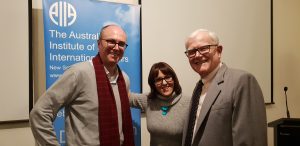A Rough Climate for Migration: the Ethical Challenge of Climate Change
On Tuesday 5 June, the Institute hosted the launch of Dr Elaine Kelly’s recently-published first book, Dwelling in the Age of Climate Change: The Ethics of Adaptation, based on her post-doctoral research at the University of Technology, Sydney. Elaine is now a Sydney-based independent scholar and writer. In dialogue with Professor Nick Mansfield, Dean of Higher Degree Research at Macquarie University, she explained some of the concepts that she explores in her book and sought to demonstrate the need for a more ethical approach to migration issues in the context of a rapidly changing climate.
Discussion addressed the theoretical and philosophical perspectives that currently and historically have informed views about migration and migration policies. Elaine explained how her understanding of the concept of migration has been shaped over time by the ‘continental theory’ of philosophers such as Heidegger, Derrida and Levinas, who have each viewed the relationships between people, place and the earth in different ways. Elaine suggested that, in order to create more sustainable solutions to large scale migration, we need to understand the inherent responsibilities each individual on the planet has to helping those in need and protecting the world around us. The way to do this, she argued, is through more pro-poor migration policies which seek to help those who are most in need, rather than the skilled, middle- class migrants who currently have priority. Human rights must also be brought to the forefront of concern and replace the largely nationalistic and exclusivist ideologies that currently dominate the politics of migration. The strengthening and development of international agreements and rights for migrants need to also be addressed in order to administer effective social justice and ensure vulnerable populations have adequate protection.

Nick Mansfield, Elaine Kelly and Ian Lincoln
Elaine highlighted the fact that poor or disadvantaged populations will be the hardest hit by climate change in the coming years. She spoke to a number of case studies of climate- related migration which she explores in detail in her book. Bangladesh, she explained, is already starting to feel the devastating impacts of extreme weather events and will soon be impacted by rising sea levels. The large-scale displacement caused by such events is placing strain on urban areas, where many of the affected populations are seeking to live and work despite limited infrastructure and resources. Elaine spoke of the different social justice issues and ethical dilemmas in relation to the loss of the Torres Strait Islands in the coming years due to sea level rise. As Australians, Torres Strait Islanders would have access to resettlement on the mainland. But this would do nothing to address the huge loss of culture that will occur and the ways in which colonial legacies of dispossession of Indigenous land will continue to play out.
Elaine and Nick also raised some interesting points about the current paradigm of migration. They argued that, although so entrenched in our current political system, people are not meant to be confined within borders and forced to be sedentary. Historically, national boundaries are recent and humans have been a migratory species, and often this migration has coincided with changes to the natural environment.
In question time, Elaine and Nick were confronted by some challenging questions relating to the future of Australia given the government’s lack of action in mitigating and adapting to climate change as well as the ethics and viability of reforms to current migration systems and ideologies. Both guests expressed concern for the future of the world given the lack of mitigation measures currently in place, and urged the audience to continue to push for policy changes and greater climate action on the part of the Australian government.
Isabella Svinos
AIIA NSW Intern